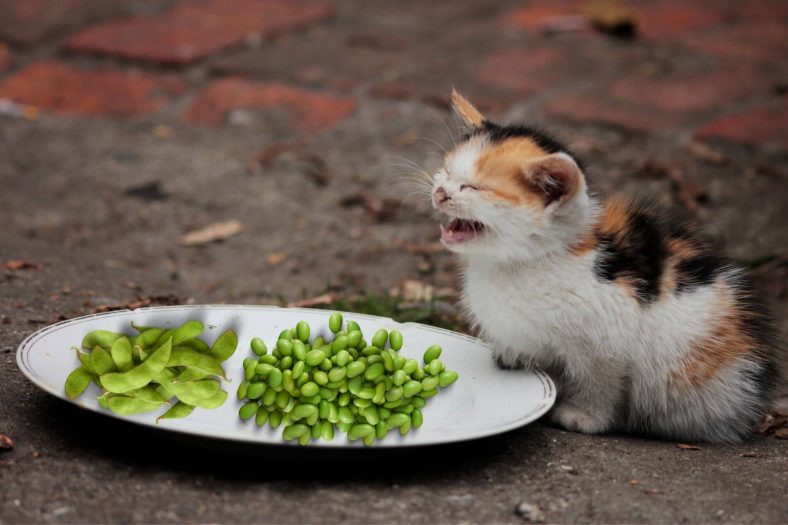Cats are known for their curious nature and their tendency to explore different types of food. As a cat owner, it is important to be aware of what foods are safe for your feline friend to consume. One such food that may raise questions is soybeans. In this article, we will delve into the topic of whether cats can eat soybeans and explore the potential benefits and risks associated with feeding soybeans to cats.

Can Cats Safely Consume Soybeans?
Soybeans are a type of legume that is commonly used in various human food products. They are rich in protein, fiber, and essential nutrients. However, when it comes to cats, their dietary requirements differ significantly from humans. Cats are obligate carnivores, which means their bodies are designed to primarily derive nutrients from animal-based sources.
While cats can derive some nutritional benefits from plant-based foods, such as fruits and vegetables, soybeans may not be the best choice for their diet. Cats have a limited ability to digest plant proteins, and soybeans contain compounds called anti-nutrients, which can interfere with nutrient absorption. Therefore, it is generally recommended to avoid feeding soybeans to cats.
Potential Risks of Feeding Soybeans to Cats
Feeding soybeans to cats can pose several risks to their health. One of the main concerns is the presence of allergens in soybeans. Cats can develop allergies to certain foods, and soybeans are known to be a common allergen in cats. Allergic reactions can manifest as skin irritations, gastrointestinal issues, or respiratory problems.
Another risk associated with soybeans is their high content of phytic acid. Phytic acid can bind to minerals in the cat’s body, such as calcium and zinc, and inhibit their absorption. This can lead to nutrient deficiencies over time, affecting the cat’s overall health and well-being.
Additionally, soybeans contain compounds called isoflavones, which act as phytoestrogens. These compounds can disrupt the hormonal balance in cats and may have adverse effects on their reproductive system. It is important to note that the long-term effects of soybean consumption in cats are not well-studied, and more research is needed to fully understand the potential risks.
Alternatives to Soybeans for Cats
If you are looking for plant-based options to supplement your cat’s diet, there are safer alternatives to soybeans. Some cats may tolerate small amounts of cooked vegetables like carrots or peas. However, it is crucial to consult with a veterinarian before introducing any new food into your cat’s diet.
To ensure that your cat receives all the necessary nutrients, it is best to focus on providing a balanced and species-appropriate diet that consists primarily of high-quality animal-based proteins. Commercial cat foods formulated specifically for feline nutritional needs are readily available and can provide a convenient and safe option for meeting your cat’s dietary requirements.
Conclusion
In conclusion, while soybeans may be a nutritious food for humans, they are not recommended for cats. Cats have specific dietary needs that are best met through animal-based proteins. Feeding soybeans to cats can pose risks such as allergies, nutrient deficiencies, and hormonal imbalances. It is always advisable to consult with a veterinarian before introducing any new food into your cat’s diet to ensure their health and well-being.
FAQs
-
Can cats have soy milk?
No, cats should not be given soy milk. Soy milk contains soybeans, which are not suitable for cats due to their limited ability to digest plant proteins and the potential risks associated with soybean consumption. -
Are there any benefits of feeding soybeans to cats?
While soybeans are a good source of protein and nutrients for humans, they are not considered beneficial for cats. Cats have specific dietary requirements that are best met through animal-based proteins. -
What are the signs of a soybean allergy in cats?
Signs of a soybean allergy in cats may include skin irritations, itching, gastrointestinal issues (such as vomiting or diarrhea), and respiratory problems (such as coughing or wheezing). If you suspect your cat has an allergy, it is important to consult with a veterinarian for proper diagnosis and guidance. -
Can cats eat other types of legumes?
Cats can derive some nutritional benefits from certain types of legumes, such as cooked and mashed peas or lentils. However, it is important to introduce new foods gradually and in consultation with a veterinarian to ensure they are safe and suitable for your cat. -
What should I do if my cat accidentally consumes soybeans?
If your cat accidentally consumes soybeans, monitor them for any signs of adverse reactions or digestive issues. If you notice any concerning symptoms, it is best to contact a veterinarian for guidance and advice.

